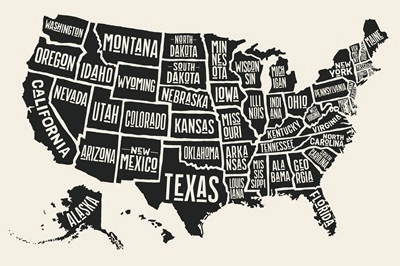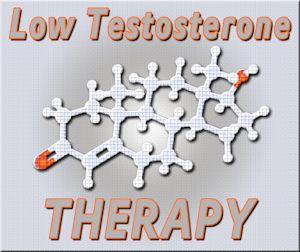
If you've ever tried to diet in your life, which most Americans have, you've probably felt frustration with the weight scale.
You spend two or three weeks working out and eating better only to find that you have just lost a little bit of weight, or perhaps even none at all! Some people even gain a little weight when they start working out. It's important to realize, however, that the scale never tells the whole story of your dieting journey.
Video Link: https://vimeo.com/290591482
Video Download: Click Here To Download Video
Video Stream: Click Here To Stream Video
Most people are somewhat aware of the concept that muscle weighs more than fat, but don't realize the implications. This fact is actually the biggest reason why people get so frustrated with scales when they start working out for health.
For people that are trying to drop fat and feel better, it may even be better not to use scales at all, and just trust your health regimen and the mirror. One of the many reasons that diets fail is because people focus only on the scale and lose faith in their ability to lose weight.
Muscle Vs. Fat
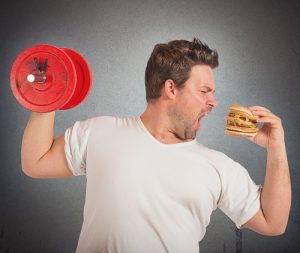 At first glance, the idea that muscle weighs more than fat might seem a little strange.
At first glance, the idea that muscle weighs more than fat might seem a little strange.
Of course, an ounce of fat is going to weigh the same as an ounce of muscle tissue. That's simple physics.
The difference between muscle and fat and how they affect your appearance is about volume and density.
Per pound, body fat takes up more space than muscle. More precisely, fat is 18% less dense than muscle and thus takes up more volume.
When you think about how this affects your body, this means that muscle mass does weigh more than fat, and makes up a higher proportion of your weight per volume.
When you start working out, your body reacts by strengthening your skeletal muscles, which directly leads to an increase in their mass.
This increase in mass can equal or even exceed your loss in body fat, which makes it seem like you aren't getting any results from your diet and workout regimen.
It's important to remember that you don't have to lose weight to improve your muscle-to-fat ratio.
If you are looking at the scale as your sole measure of dieting success, you are bound to get discouraged and fail.
There are three things that you should do if you want to keep accumulating the benefits of exercise and diet over time: Be Patient, Look in the Mirror, and pay attention to How You Feel, not just how you look.
Comparing Muscle to Fat – A Visual Representation
The picture below shows 5 pounds of body fat and 5 pounds of muscle side by side:
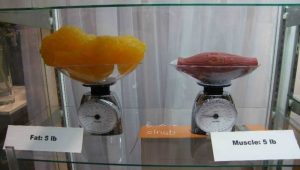
As you can see, muscle takes up far less space than fat.
Furthermore, you can tell that the structure of body fat and muscle also strongly contributes to how they make you look.
Because skeletal muscle is smooth and dense, it not only occupies less space, but it also fills that space in a more aesthetically pleasing way. Body fat naturally looks lumpy and disorganized. It fills up space with little rhyme or reason other than being constrained by the skin.
By merely looking at the two pictures, you can easily see which one you would rather have more of. Muscles are naturally pleasing to the eye, and the impact they have on your appearance is impressive, whereas too much fat simply can make you look like an amorphous blob.
What are the Health Benefits of Maintaining Healthy Muscle Mass?
- Lower Risk of Diabetes, Blood Sugar Spikes, and Increased Insulin
- Sensitivity
- Enhanced Metabolism
- Improved Aerobic Capacity
- Less Fatigue and More Energy
- Improved Self-Perception
- Better Balance and Range of Motion
- More Strength
- Aesthetically Pleasing Muscles
- Lower Risk of Injury
How Can I Increase My Metabolism?
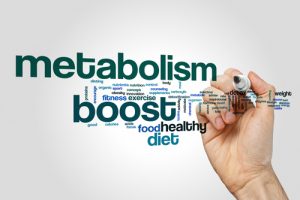 One pound of fat is the equivalent of 3,500 calories of stored energy that your body can use but doesn't need.
One pound of fat is the equivalent of 3,500 calories of stored energy that your body can use but doesn't need.
There are two ways to get rid of that weight, and they both have to do with your basal metabolic rate. Basal metabolic rate refers to the number of calories your body burns when at rest. If you intake fewer calories than you burn in a day, you lose weight.
If you exercise to increase your calories burned, you can also lose weight. Of course, the best course of action is to combine both to maximize weight loss and the health benefits of your decisions.
Your body releases most pent-up fat energy as respiration, and around 14% of fat is evacuated through sweat and urination.
Building muscle mass, in the long run, helps you burn body fat even without dieting because larger muscles burn more energy even when at rest. This increases your Basal Metabolic Rate and makes it even easier to burn calories through diet and exercise.
Fat burns calories as well, but at a much slower rate. Fat will burn two calories every hour, whereas muscle will burn six calories every hour. That means that pound for pound, muscle has triple the calorie-burning power of fat, even at rest.
Over the course of a day, one pound of muscle will metabolize 94 more calories than the same amount of fat. It's clear to see how much of an impact that weight lifting can have on your weight loss regimen. For patients on or considering Low-T Treatment with Testosterone, these benefits are amplified even further!
Don't Worry About the Scale!
It may seem like a good idea to keep track of the scale when trying to lose weight. Most people think that keeping regular tabs on their weight loss progress will help, but in fact, it's just as likely, or even more likely, to make you more likely to give up.
This is because burning up body fat is more important than losing weight, and increasing muscle mass will cause you to lose weight slower than you think that you should. It's better just to throw your scale away.
Just trust your eyes and your long-term plans and goals, and you're far more likely to see success!
Contact Us Today For A Free Consultation

- Testosterone for Women [Last Updated On: December 1st, 2023] [Originally Added On: December 29th, 2013]
- Testosterone Androgen [Last Updated On: December 11th, 2023] [Originally Added On: December 29th, 2013]
- Testosterone and Body Building [Last Updated On: December 14th, 2023] [Originally Added On: December 30th, 2013]
- Testosterone Levels [Last Updated On: December 6th, 2023] [Originally Added On: December 31st, 2013]
- Testosterone Gel, Cream, and the Testosterone Patch [Last Updated On: November 28th, 2023] [Originally Added On: December 31st, 2013]
- Buy Testosterone | Types of Testosterone Replacement Therapy Programs, Injections, Cream and Gel [Last Updated On: December 13th, 2023] [Originally Added On: December 31st, 2013]
- Buy Testosterone Injections Online, Testosterone Prescription for Low T, Testosterone Replacement Therapy [Last Updated On: October 16th, 2020] [Originally Added On: January 1st, 2014]
- Aging and Testosterone Replacement Therapy [Last Updated On: December 12th, 2023] [Originally Added On: January 3rd, 2014]
- What Causes Low Testosterone [Last Updated On: December 10th, 2023] [Originally Added On: January 7th, 2014]
- Hormone Levels in Men [Last Updated On: December 4th, 2023] [Originally Added On: January 12th, 2014]
- Hormone Level Testing [Last Updated On: November 29th, 2023] [Originally Added On: January 13th, 2014]
- Types of Testosterone Products and Delivery [Last Updated On: December 8th, 2023] [Originally Added On: January 22nd, 2014]
- Testosterone Therapy Helps Men with Low-T Ward Off Prostate Cancer [Last Updated On: May 29th, 2024] [Originally Added On: December 29th, 2019]
- The Importance of Dietary Fat for Testosterone Production [Last Updated On: July 8th, 2024] [Originally Added On: January 2nd, 2020]
- Testosterone Deficiency and Low-T at Epidemic Levels Among Men in the United States [Last Updated On: May 27th, 2024] [Originally Added On: May 17th, 2020]
- The Effects of Testosterone Therapy on Male Patients -- Who Should Use Testosterone? [Last Updated On: December 20th, 2023] [Originally Added On: June 16th, 2020]
- Does Ibuprofen Contribute to Low Testosterone? [Last Updated On: January 27th, 2024] [Originally Added On: June 20th, 2020]
- The Link Between Testosterone and Lower Rates of Autoimmune Diseases Among Men [Last Updated On: January 30th, 2024] [Originally Added On: June 21st, 2020]
- Weight Cycling and the Problem with Crash Dieting [Last Updated On: April 8th, 2024] [Originally Added On: July 30th, 2020]
- Reexamining Bio-Identical Testosterone Therapy [Last Updated On: June 18th, 2024] [Originally Added On: August 12th, 2020]
- The Role of Nitric Oxide in Cancer Proliferation And Prevention [Last Updated On: May 3rd, 2024] [Originally Added On: August 26th, 2020]
- Understanding Heartburn in the 21st Century [Last Updated On: April 24th, 2024] [Originally Added On: August 28th, 2020]
- What is Erectile Dysfunction? [Last Updated On: April 20th, 2024] [Originally Added On: August 30th, 2020]
- Sermorelin Acetate Drug Information [Last Updated On: April 7th, 2024] [Originally Added On: August 31st, 2020]
- Exercise and Mental Health [Last Updated On: April 5th, 2024] [Originally Added On: September 1st, 2020]
- The Importance of Proteins, Carbs, and Fats [Last Updated On: March 11th, 2024] [Originally Added On: September 2nd, 2020]
- Low-T Treatment Before and After -- How Testosterone Therapy Improves Vitality [Last Updated On: April 9th, 2024] [Originally Added On: September 6th, 2020]
- Changes to LabCorp Guidelines for Low-T Diagnosis and How They Impact Your Treatment [Last Updated On: July 14th, 2024] [Originally Added On: September 22nd, 2020]
- The Effects of Testosterone on Asthma Prevalence Among Men and Women [Last Updated On: February 19th, 2024] [Originally Added On: October 6th, 2020]
- 7 Exercises to Elevate Testosterone Levels [Last Updated On: June 13th, 2024] [Originally Added On: October 10th, 2020]
- Vitamin A is Essential for Good Health - Are You Getting Enough ? [Last Updated On: April 16th, 2024] [Originally Added On: October 14th, 2020]
- Testosterone and Diet – How to Support Testosterone Levels with Healthy Eating [Last Updated On: June 7th, 2024] [Originally Added On: October 29th, 2020]
- The Significance of Telomeres in Stem Cell Treatments [Last Updated On: March 16th, 2024] [Originally Added On: November 27th, 2020]
- The Influence of Testosterone on Protective Mating Behaviors in Men [Last Updated On: January 25th, 2024] [Originally Added On: December 6th, 2020]
- The Role of Testosterone in Women's Health [Last Updated On: December 24th, 2023] [Originally Added On: December 7th, 2020]
- Testosterone Promotes Bone Health and Can Help Treat Osteoporosis [Last Updated On: February 15th, 2024] [Originally Added On: December 17th, 2020]
- The Relationship Between Testosterone and Cortisol [Last Updated On: April 2nd, 2024] [Originally Added On: December 19th, 2020]
- The Importance of Sex Hormone-Binding Globulin (SHBG) for Healthy Testosterone Levels [Last Updated On: March 9th, 2024] [Originally Added On: December 28th, 2020]
- 12 Health Issues That Can Kill Libido and Limit Sexual Performance [Last Updated On: May 23rd, 2024] [Originally Added On: January 3rd, 2021]
- 4 Foods to Boost Your Testosterone Levels [Last Updated On: February 7th, 2024] [Originally Added On: January 4th, 2021]
- Low Testosterone Symptoms [Last Updated On: December 31st, 2023] [Originally Added On: January 7th, 2021]
- Is Male Menopause Real? The Science of Andropause [Last Updated On: January 15th, 2024] [Originally Added On: January 11th, 2021]
- Relieve Fatigue and Increase Energy with Testosterone Replacement Therapy [Last Updated On: January 16th, 2024] [Originally Added On: January 16th, 2021]
- How to Administer a Testosterone Injection -- Low-T Injection Guide [Last Updated On: February 28th, 2024] [Originally Added On: January 17th, 2021]
- Testosterone Levels Associated with Serotonin Activity in the Brain [Last Updated On: March 26th, 2024] [Originally Added On: January 19th, 2021]
- Grumpy Old Man Syndrome – Causes and Treatments [Last Updated On: June 8th, 2024] [Originally Added On: January 22nd, 2021]
- The Effects of Beer on Testosterone Production and Gynecomastia [Last Updated On: March 21st, 2024] [Originally Added On: January 30th, 2021]
- Testosterone Frequently Asked Questions [Last Updated On: February 6th, 2024] [Originally Added On: February 26th, 2021]
- Testosterone Supplements: Vitamin and Amino Acid Pills Versus Real Testosterone [Last Updated On: November 21st, 2024] [Originally Added On: March 1st, 2021]
- Testosterone Side Effects, Risks, Dangers and Negative Effects [Last Updated On: November 7th, 2024] [Originally Added On: March 2nd, 2021]
- Testosterone for Men [Last Updated On: February 20th, 2024] [Originally Added On: April 13th, 2021]
- Testosterone Testing [Last Updated On: November 9th, 2024] [Originally Added On: May 7th, 2021]
- Hormone Replacement Therapy: Commonly Asked Questions [Last Updated On: February 20th, 2024] [Originally Added On: June 16th, 2023]
Word Count: 1015






